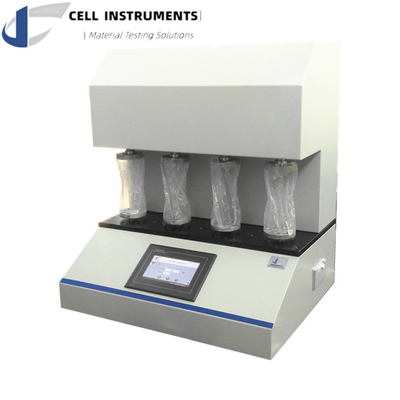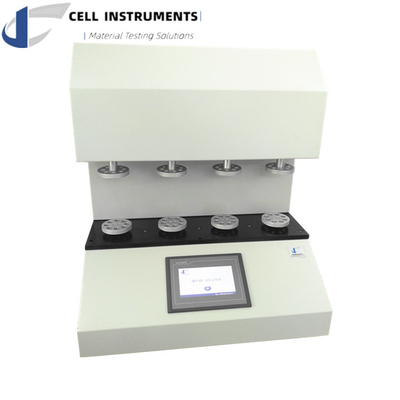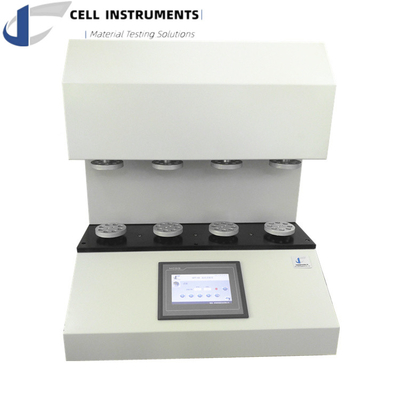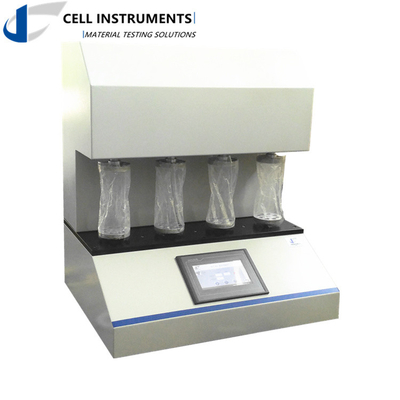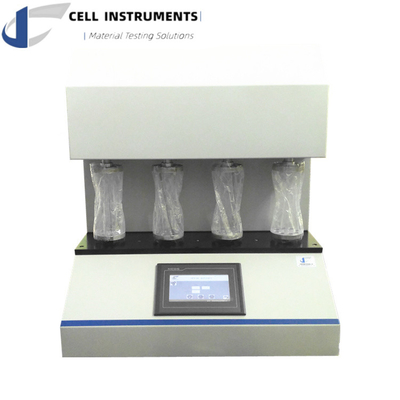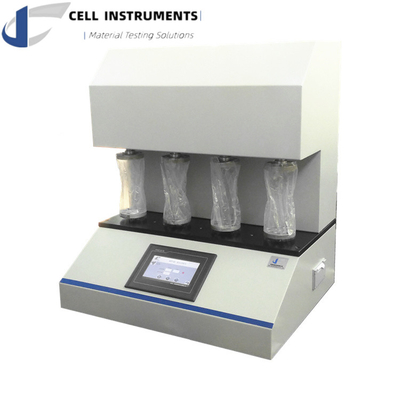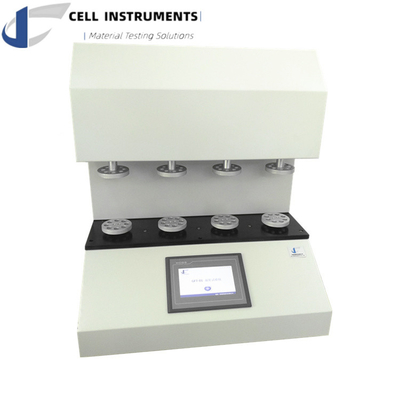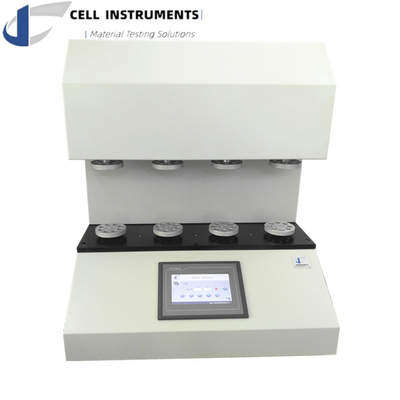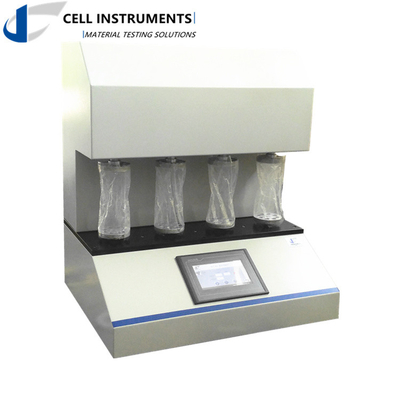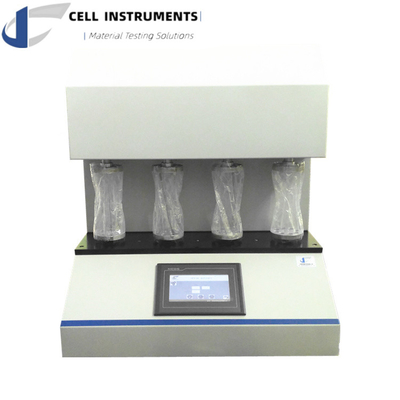Automatic Multi-Station Composite Barrier Film Flex Durability Tester ASTM F392 Material Flex Durability Testing Machine
| Flex Frequency | 45 /minute | Flex Angle | 440° (90 Mm) Or 400° (80 Mm) |
|---|---|---|---|
| Capacity | 2.5 N.m | Horizontal Stroke | 155 Mm Or 80 Mm |
| Stations | 4 | Sample Size | 280 Mm X 200 Mm |
| Power | 110~220V |
Automatic Multi-Station Composite Barrier Film Flex Durability Tester ASTM F392 Material Flex Durability Testing Machine
![]()
Introduction to the ASTM F392 Material Flex Durability Testing Machine
The ASTM F392 Material Flex Durability Testing Machine is an advanced testing instrument engineered to evaluate the flex durability of flexible barrier materials. It is particularly essential for assessing the Gelboflex resistance of materials like films, composites, and coating films. This property is critical because it determines how well materials can withstand repetitive strain without cracking or puncturing, making it indispensable for industries like packaging, food, pharmaceuticals, textiles, and more. By simulating real-world stress conditions, the ASTM F392 Material Flex Durability Testing Machine ensures that materials are strong enough to withstand transportation and distribution challenges.
Key Features and Advantages of the ASTM F392 Material Flex Durability Testing Machine
-
Precise Flex Durability Measurement
The ASTM F392 Material Flex Durability Testing Machine accurately measures the resistance of materials to flex cracking, providing invaluable data on how flexible barrier materials perform under repetitive strain. This allows manufacturers to assess their products' resistance to flex failure and pinhole formation, which is critical for packaging integrity. -
Enhances Package Integrity
One of the most important roles of the ASTM F392 Material Flex Durability Testing Machine is to ensure that packaging materials maintain their integrity throughout distribution. By testing for flex resistance, it helps prevent punctures or tears in packaging, thus ensuring that the product inside remains safe and secure during transit. -
Versatility Across Industries
This testing machine is compatible with a variety of materials, including films, composites, and coatings, making it suitable for multiple industries such as plastics, food packaging, pharmaceuticals, printing, textiles, and more. This versatility makes it a one-stop solution for manufacturers in need of reliable flex durability testing.
Why Choose the ASTM F392 Material Flex Durability Testing Machine?
For any company that deals with flexible barrier materials, the ASTM F392 Material Flex Durability Testing Machine is an essential piece of equipment. It serves as a quality control tool to ensure that materials meet the rigorous demands of packaging and distribution. The machine's ability to accurately simulate the stress conditions that materials will face during real-world use is key to identifying weaknesses before they cause failures.
-
Quality Assurance
With the ASTM F392 Material Flex Durability Testing Machine, manufacturers can ensure that their materials meet industry standards for flex crack resistance. This is crucial for maintaining product integrity and preventing damage during distribution. -
Regulatory Compliance
The ASTM F392 Material Flex Durability Testing Machine helps manufacturers comply with ASTM F392 and other relevant standards for flex durability, providing peace of mind that their products adhere to international benchmarks. -
Durability Verification
The machine verifies the durability of flexible barrier materials, helping prevent potential package failure by assessing materials' ability to resist the formation of cracks and punctures over time.
Applications of the ASTM F392 Material Flex Durability Testing Machine
The ASTM F392 Material Flex Durability Testing Machine is widely used in various industries for assessing the flex durability of packaging materials, including:
- Plastics Industry: Ensures the durability of flexible plastic packaging materials.
- Food and Pharmaceutical Packaging: Maintains the integrity of packaging materials used in food and pharmaceuticals, preventing contamination.
- Textile Industry: Assesses the flex resistance of barrier materials in textile packaging.
- Printing and Adhesives: Verifies the quality of films and coatings used in printing and adhesive applications.
Complying with Industry Standards
The ASTM F392 Material Flex Durability Testing Machine complies with ASTM F392, the industry standard for flex durability testing of flexible barrier materials. This ensures that all test results are accurate, repeatable, and in line with recognized international standards.
Technical Specifications
| Flex Frequency | 45 /minute |
| Flex Angle | 440° (90 mm) or 400° (80 mm) |
| Capacity | 3.5 N.m |
| Horizontal Stroke | 155 mm or 80 mm |
| Stations | 3/4 |
| Sample Size | 280 mm x 200 mm |
| Power | 110~220V |
Innovative Features of the ASTM F392 Material Flex Durability Testing Machine
The ASTM F392 Material Flex Durability Testing Machine boasts a range of advanced features designed to enhance usability and testing efficiency:
- PLC Control: The system is equipped with precise PLC control for accurate operation.
- HMI Touch Screen: An intuitive touch screen interface provides easy navigation and access to important information.
- Microprinter: Records test results in real time, allowing for quick data output and analysis.
- Switchable Stroke Modes: Users can easily switch between long and short stroke modes, providing flexibility for different testing needs.
- Multiple Test Modes: Five standard test modes (A, B, C, D, and E) offer various testing conditions to suit specific requirements.
Conclusion
The ASTM F392 Material Flex Durability Testing Machine is a vital tool for any industry that relies on flexible barrier materials. With its accurate testing capabilities, compliance with industry standards, and advanced features, it ensures that materials maintain their integrity throughout the distribution process. The tester provides reliable results, contributing to the production of packaging materials that meet stringent durability requirements.
![]()



